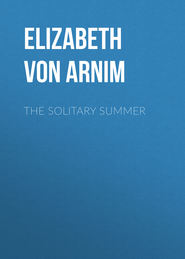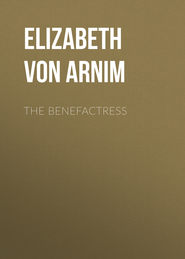По всем вопросам обращайтесь на: info@litportal.ru
(©) 2003-2024.
✖
The Adventures of Elizabeth in Rügen
Настройки чтения
Размер шрифта
Высота строк
Поля
But I regret to say the man in spectacles seemed extremely shy of me; whether it was because the custodian had taken me for his wife, or because I was an apparently unattached female wandering about and drinking coffee by myself contrary to all decent custom, I do not know. Anyhow he met my well-meant attempt to explain Mrs. Harvey-Browne to him with suspicion, and murmuring something about the English being indeed very strangely mannered, he edged cautiously away.
We now straggled through the rooms separately,—Ambrose in front with the guide, his mother by herself, I by myself, and a good way behind us, the mortified man in spectacles. He made no effort to take my advice and talk to Ambrose, but kept carefully as far away from the rest of us as possible; and when we presently found ourselves once more outside the princely apartments, on the opposite side to the door by which we had gone into them, he slid forward, shook off his felt slippers with the finality of one who shakes off dust from his feet, made three rapid bows, one to each of us, and hurried down the stairs. Arrived at the bottom we saw him take his stick from the Fräulein, shake his head with indignant vigour when she tried to make him take my sunshade too, pull open the heavy door, and almost run through it. He slammed it with an energy that made the Jagdschloss tremble.
The Fräulein looked first at the slammed door, then at the sunshade, and then up at me. 'Quarrelled,' said the Fräulein's look as plainly as speech.
Ambrose looked at me too, and in his eyes was an interrogation.
Mrs. Harvey-Browne looked at me too, and in her eyes was coldest condemnation. 'Is it possible,' said Mrs. Harvey-Browne's eyes, 'that any one can really marry such a person?'
As for me, I walked downstairs, my face bland with innocence and unconcern. 'How delightful,' I said enthusiastically, 'how truly delightful these walls look, with all the antlers and things on them.'
'Very,' said Ambrose.
Mrs. Harvey-Browne was silent. Probably she had resolved never to speak to me again; but when we were at the bottom, and Ambrose was bestowing fees on the Fräulein and the custodian, she said, 'I did not know your husband was travelling with you.'
'My husband?' I repeated inquiringly. 'But he isn't. He's at home. Minding, I hope, my neglected children.'
'At home? Then who—then whose husband was that?'
'Was what?' I asked, following her eyes which were fixed on the door so lately slammed.
'Why, that man in spectacles?'
'Really, how can I tell? Perhaps nobody's. Certainly not mine.'
Mrs. Harvey-Browne stared at me in immense surprise. 'How very extraordinary,' she said.
THE SIXTH DAY—Continued
THE GRANITZ WOODS, SCHWARZER SEE, AND KIEKÖWER
In the woods behind Binz, alone in the heart of them, near a clearing where in past days somebody must have lived, for ancient fruit trees still mark the place that used to be a garden, there is a single grave on which the dead beech leaves slowly dropping down through the days and nights of many autumns, have heaped a sober cover. On the headstone is a rusty iron plate with this inscription—
Hier ruht ein Finnischer Krieger
1806.
There is no fence round it, and no name on it. Every autumn the beech leaves make the unknown soldier a new brown pall, and through the sparkling frozen winters, except for the thin shadows of naked branches, he lies in sunshine. In the spring the blue hepaticas, children of those that were there the first day, gather about his sodden mound in little flocks of loveliness. Then, after a warm rain, the shadows broaden and draw together, for overhead the leaves are bursting; the wind blowing on to him from the clearing is scented, for the grass out there has violets in it; the pear trees in the deserted garden put on their white robes of promise; and then comes summer, and in the long days there are wanderers in the woods, and the chance passer-by, moved perhaps by some vague sentiment of pity for so much loneliness, throws him a few flowers or a bunch of ferns as he goes his way. There was a cross of bracken lying on the grave when I came upon it, still fresh and tied together with bits of grass, and a wreath of sea-holly hung round the headstone.
Sitting down by the side of the nameless one to rest, for the sun was high and I began to be tired, it seemed to me as I leaned my face against his cool covering of leaves, still wet with the last rain, that he was very cosily tucked away down there, away from worries and the chill fingers of fear, with everything over so far as he was concerned, and each of the hours destined for him in which hard things were to happen lived through and done with. A curiosity to know how he came to be in the Granitz woods at a time when Rügen, belonging to the French, had nothing to do with Finland, made me pull out my guide-book. But it was blank. The whole time I was journeying round Rügen it was invariably blank when it ought to have been illuminating. What had this man done or left undone that he should have been shut out from the company of those who are buried in churchyards? Why should he, because he was nameless, be outcast as well? Why should his body be held unworthy of a place by the side of persons who, though they were as dead as himself, still went on being respectable? I took off my hat and leaned against the Finnish warrior's grave and stared up along the smooth beech trunks to the point where the leaves, getting out of the shade, flashed in the sun at the top, and marvelled greatly at the ways of men, who pursue each other with conventions and disapproval even when their object, ceasing to be a man, is nothing but a poor, unresentful, indifferent corpse.
It is—certainly with me it is—a symptom of fatigue and want of food to marvel at the ways of men. My spirit grows more and more inclined to carp as my body grows more tired and hungry. When I am not too weary and have not given my breakfast to fowls, my thoughts have a cheerful way of fixing themselves entirely on the happy side of things, and life seems extraordinarily charming. But I see nothing happy and my soul is lost in blackness if, for many hours, I have had no food. How useless to talk to a person of the charities if you have not first fed him. How useless to explain that they are scattered at his feet like flowers if you have fed him too much. Both these states, of being over-fed and not fed enough, are equally fatal to the exquisitely sensitive life of the soul. And so it came about that because it was long past luncheon-time, and I had walked far, and it was hot, I found myself growing sentimental over the poor dead Finn; inclined to envy him because he could go on resting there while I had to find a way back to Binz in the heat and excuse my absence to an offended cousin; launching, indignant at his having been denied Christian burial, into a whole sea of woful reflections on the spites and follies of mankind, from which a single piece of bread would have rescued me. And as I was very tired, and it was very hot, and very silent, and very drowsy, my grumblings and disapprovals grew gradually vaguer, grew milder, grew confused, grew intermittent, and I went to sleep.
Now to go to sleep out of doors on a fine summer afternoon is an extremely pleasant thing to do if nobody comes and looks at you and you are comfortable. I was not exactly comfortable, for the ground round the grave was mossless and hard; and when the wind caught it the bracken cross tickled my ear and jerked my mind dismally on to earwigs. Also some spiders with frail long legs which they seemed to leave lying about at the least and gentlest attempt to persuade them to go away, walked about on me and would not walk anywhere else. But presently I left off feeling them or caring and sank away deliciously into dreams, the last thing I heard being the rustling of leaves, and the last thing I felt the cool wind lifting my hair.
And now the truly literary, if he did not here digress into a description of what he dreamed, which is a form of digression skipped by the truly judicious, would certainly write 'How long I had slept I know not,' and would then tell the reader that, waking with a start, he immediately proceeded to shiver. I cannot do better than imitate him, leaving out the start and the shiver, since I did neither, and altering his method to suit my greater homeliness, remark that I don't know how long I had been asleep because I had not looked at a watch when I began, but opening my eyes in due season I found that they stared straight into the eyes of Mrs. Harvey-Browne, and that she and Brosy were standing side by side looking down at me.
Being a woman, my first thought was a fervent hope that I had not been sleeping with my mouth wide open. Being a human creature torn by ungovernable passions, my second was to cry out inwardly and historically, 'Will no one rid me of this troublesome prelatess?' Then I sat up and feverishly patted my hair.
'I am not in the guide-book,' I said with some asperity.
'We came to look at the grave,' smilingly answered Mrs. Harvey-Browne.
'May I help you up?' asked Ambrose.
'Thanks, no.'
'Brosy, fetch me my camp-stool out of the fly—I will sit here a few minutes with Frau X. You were having a little post-prandial nap?' she added, turning to me still smiling.
'Ante-prandial.'
'What, you have been in the woods ever since we parted this morning at the Jagdschloss? Brosy,' she called after him, 'bring the tea-basket out as well. My dear Frau X., you must be absolutely faint. Do you not think it injudicious to go so many hours without nourishment? We will make tea now instead of a little later, and I insist on your eating something.'
Really this was very obliging. What had happened to the bishop's wife? Her urbanity was so marked that I thought it could only be a beautiful dream, and I rubbed my eyes before answering. But it was undoubtedly Mrs. Harvey-Browne. She had been home since I saw her last, rested, lunched, put on fresh garments, perhaps bathed; but all these things, soothing as they are, could not by themselves account for the change. Also she spoke to me in English for the first time. 'You are very kind,' I murmured, staring.
'Just imagine,' she said to Ambrose, who approached across the crackling leaves with the camp-stool, tea-basket, and cushions from the seats of the fly waiting in the forest road a few yards away, 'this little lady has had nothing to eat all day.'
'Oh I say!' said Brosy sympathetically.
'Little lady?' I repeated to myself, more and more puzzled.
'If you must lean against a hard grave,' said Brosy; 'at least, let me put this cushion behind your back. And I can make you much more comfortable if you will stand up a moment.'
'Oh I am so stiff,' I exclaimed as he helped me up; 'I must have been here hours. What time is it?'
'Past four,' said Brosy.
'Most injudicious,' said his mother. 'Dear Frau X., you must promise me never to do such a thing again. What would happen to those sweet children of yours if their little mother were to be laid up?'
Dear, dear me. What was all this? Sweet children? Little mother? I could only sit on my cushions and stare.
'This,' she explained, noticing I suppose that I looked astonished, and thinking it was because Brosy was spreading out cups and lighting the spirit-lamp so very close to the deceased Finn, 'is not desecration. It is not as though we were having tea in a churchyard, which of course we never would have. This is unconsecrated ground. One cannot desecrate that which has never been consecrated. Desecration can only begin after consecration has taken place.'
I bowed my head and then, cheered into speech by the sight of an approaching rusk, I added, 'I know a family with a mausoleum, and on fine days they go and have coffee at it.'
'Germans, of course,' said Mrs. Harvey-Browne, smiling, but with an effort. 'One can hardly imagine English–'
'Oh yes, Germans. When any one goes to see them, if it is fine they say, "Let us drink coffee at the mausoleum." And then they do.'
'Is it a special treat?' asked Brosy.
'The view there is very lovely.'
'Oh I see,' said Mrs. Harvey-Browne, relieved. 'They only sit outside. I was afraid for a moment that they actually–'
'Oh no,' I said, eating what seemed to be the most perfect rusk ever produced by German baker, 'not actually.'
'What a sweet spot this is to be buried in,' remarked Mrs. Harvey-Browne, while Brosy, with the skill of one used to doing it, made the tea; and then according to the wont of good women when they speak of being buried, she sighed. 'I wonder,' she went on, 'how he came to be put here.'











